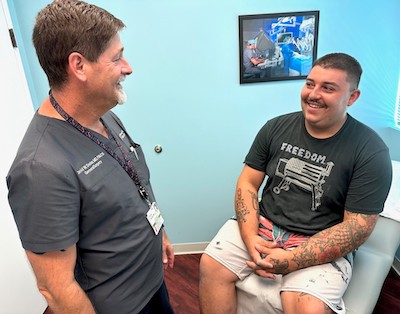After Years of Debilitating Symptoms, Patient with ITP Is Feeling Well
August 8, 2023
When Taylor Butler, 23, of East Bradenton, received an urgent call from his doctor’s office shortly after having routine blood work in September of 2019, he felt like his worst fear was coming true.

“I had a phobia about seeing doctors and, instead, would just power through,” says Butler, who had been experiencing extreme fatigue, night sweats and excessive nose bleeds for as long as he can remember. “But I finally felt that it was time to get checked out to make sure everything was OK.”
Very quickly he understood the urgency of his doctor’s calls. The lab work indicated dangerously low levels in his blood counts, including his platelets, which help blood clot, and neutrophils, a type of white blood cell that helps protect the body from infection and injury.
He was admitted to a local Florida hospital and, after almost two weeks of tests, more blood work and evaluations from several specialists, he was diagnosed with Idiopathic Thrombocytopenic Purpura (ITP).
What Is ITP
ITP is a rare autoimmune disease that occurs when the spleen destroys too many of the body’s platelets prematurely.
“As fast as the body makes the platelets, the spleen filters them out too quickly,” says general surgeon David Dexter, MD, of Lakewood Ranch Medical Group General Surgery, in explaining the condition. “Science has not yet figured out why this happens.”
Monitoring and Treatment
Once stabilized and discharged from the hospital, Butler was prescribed steroid medications and, if necessary, infusion therapy.
“I was on a high dosage of steroid medications,” says Butler. “I was bloated and had migraines. I felt extremely sluggish and super fatigued and depressed. I had a ‘moon face,’ because my face rounded out so much from the water retention. When I looked in the mirror, I felt as if I did not even know who I was anymore.”
Despite the distressing side effects, the medication did help to stabilize Butler’s condition. But then the COVID-19 pandemic hit, and he had trouble accessing the healthcare he needed and resorted to self-monitoring. Fast forward to July 4, 2022, when Butler experienced a nosebleed that was so bad he was soaking through towels, and blood was filling his nasal cavity and coming out of his eyes. His fiancé rushed him to the emergency department at Lakewood Ranch Medical Center, where lab work indicated that he was back to where he was in 2019 with dangerously low blood level counts.
This time he was admitted to Lakewood Ranch Medical Center and stayed for five days. Upon discharge, he began seeing hematologist Amir Harandi, MD, who restarted treatment with steroid medications. Butler was once again dealing with debilitating side effects, and then treatment with the medication stopped working. He was referred to Dr. Dexter for robotic splenectomy.
Robotic Splenectomy
Robotic splenectomy is a minimally invasive procedure to remove the spleen, a fist-sized organ in the left side of the abdomen and an important part of the immune system. When the spleen needs to be removed, the liver can take over many of its functions. Surgery preparation includes receiving vaccinations to boost the immune system and medications to normalize blood platelet levels as much as possible.
“Since the spleen is the site where the platelets are destroyed, if you remove the spleen, you remove that process,” says Dr. Dexter. “Splenectomy is not a guarantee, but for most people, it does help.” According to Butler, his blood levels began to normalize within one day of having the surgery.
“Dr. Dexter made me feel immediately comfortable,” says Butler. “He was very thorough in explaining everything to me. When I woke up from the surgery, I felt an incredible weight lifted from my shoulders.” Since the procedure is minimally invasive, Butler did not have to worry about missing too much time at work in his job as a supervisor for a luxury-boat-building company.
“Robotic surgery requires only a very small incision,” says Dr. Dexter. “This often means a much quicker recovery than with open surgery and a significant decrease in the risk of wound infection.”
“Our practice is very proud to offer advanced and complex surgeries, right here at Lakewood Ranch Medical Center,” he adds.
Butler’s advice to other ITP patients is to consider every option. “In my case, robotic splenectomy was life-changing,” he says. Butler and his fiancé recently purchased a house in Arcadia, Florida. The couple plans to get married in 2024.
Learn more about minimally invasive robotic surgery →
